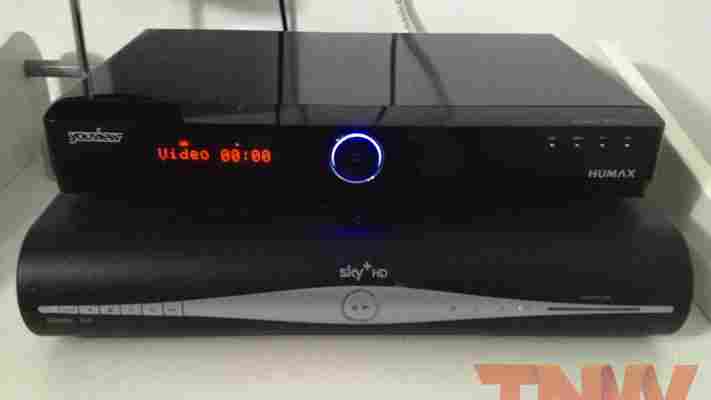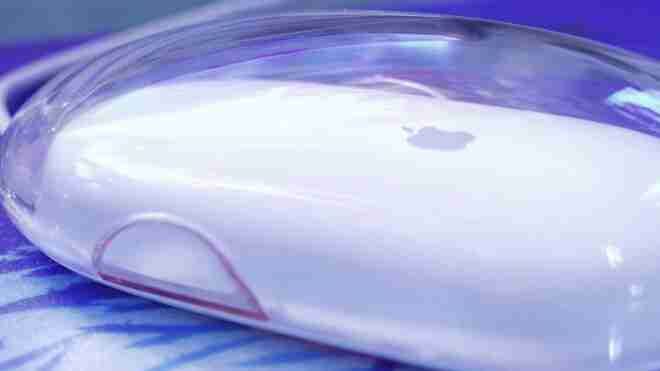A joint venture by some of the UK’s biggest TV and broadband brands, including the BBC, Channel 4, BT and TalkTalk, YouView aims to bring together catch-up TV services together on one platform, but it has faced delay-after-delay over the past couple of years.

Founded initially in September 2010, the project could have led the way for digital TV-viewing platforms in the UK. Last year, Amstrad founder Lord Alan Sugar joined YouView as Chairman, and was set to “ cure or kill off ” the service, but finally it’s due to formally launch at a press event next week.
At the event, partners are expected to unveil their set-top boxes, demonstrating the hardware that will help rival Virgin Media, Sky and BT’s existing solutions but they have already started making their way to testers.
An anonymous tipster sent The Next Web some shots of a new Humax YouView box, giving us a first look what the company has planned for its IPTV service.
YouView’s backers hoped to launch the service before the 2012 Olympics in London but have said that it is “more important to get the product right than rush it out to market.” At the moment, the service is limited to a select number of channels but more are expected to be added before launch.
YouView players are expected to launch in the coming months, delivering 70 digital channels from Freeview, the last 7 day’s catch up, plus series recording and thousands of programmes on demand.
HP: No plans to offer a BYOD program since using competitors’ products would be ’embarrassing’
Last month, HP CEO Meg Whitman said her company has to “ultimately offer a smartphone.” Well, she better act fast, as apparently HP only wants its employees to use their products: there’s no bring your own device (BYOD) program in sight. The reason? HP executives would find it humiliating to official approve Android and iOS devices for use around the office.

“HP’s policy is that we don’t offer BYOD within HP and that will not change soon,” Eric Cador, who runs the merged PC and printing businesses in EMEA, told The Register . “Why? It would be embarrassing – more importantly it would be embarrassing for our employees. Employees have to be proud of our products.”
This seems like a very ignorant way of doing things. HP doesn’t currently offer a smartphone. Its tablet offerings are a joke. The hardware giant should be striving to make products that its employees want to use, not limiting access to competitor devices due to pride issues.
This is the type of management that lowers employee morale. If your company can’t keep up with changes in the industry, you’ll be tempted to leave. It’s as simple as that.
In fact, I would argue that HP should have iPads, iPhones, Samsung Galaxies, Nexus 7s, and Android devices all around the office. Clearly these devices are in demand, and HP employees as well as HP executives should be seeing them on a daily basis to learn what works and what doesn’t.
Yes, managing employees’ personal devices can be a pain, and there are obviously security risks that need particular attention. The extra work is, however, something worth taking on if it means making sure your company stays relevant.
See also – HP CEO Meg Whitman: ‘We have to ultimately offer a smartphone’ and HP outs pricing on full Windows 8 PC lineup
Image credit: beermug
Brands: Apple the biggest winner in 2012, BlackBerry the biggest loser, Google passes Microsoft
We all know Apple’s iPhone is wiping the floor with RIM’s BlackBerry, but just how bad is it? Interbrand today announced its “ Best Global Brands 2012 ” report, and the results aren’t pretty: Cupertino’s brand value in dollars grew the most this year, while Waterloo’s brand value saw the biggest drop out of all the companies that made the top 100 list.

Apple’s brand value increased a whopping 129 percent to $76.58 billion, the most for any company on the list, pushing it six spots up from eight last year to second place this year. Who was number one? Coca-Cola took gold, of course, with a brand value of $77.84 billion.
Microsoft’s brand meanwhile fell 2 percent to $57.85 billion, causing it to drop from third place to fifth. This let Google surpass its rival for the first time, as the search giant saw its brand grow 26 percent to $69.73 billion, by maintaining its fourth place spot. IBM was third with a brand value of $75.53 billion.
RIM’s BlackBerry brand meanwhile fell 39 percent, dropping from number 56 last year to number 93 this year, with a brand value of $3.92 billion. Even Facebook, which wasn’t on the list last year, debuted higher at number 69 with a brand value of $5.42 billion.
There are a handful of other technology companies I felt were worth noting as they moved around between 2011 and 2012:
Intel is up 12 percent to $32.89 billion (moved from number 7 to number 8).
Samsung is up 40 percent to $32.89 billion (moved from number 17 to number 9).
Cisco is up 7 percent to $27.20 billion (moved from number 13 to number 14).
HP is down 8 percent to $26.09 billion (moved from number 10 to number 15).
Oracle is up 28 percent to $22.13 billion (moved from number 20 to number 18).
Nokia is down 16 percent to $21.01 billion (moved from number 14 to number 19).
Amazon is up 46 percent to $18.63 billion (moved from number 26 to number 20).
Canon is up 3 percent to $12.03 billion (moved from number 33 to number 30).
eBay is up 12 percent to $10.95 billion (unmoved at number 36).
Sony is down 8 percent to $9.11 billion (moved from number 35 to number 40).
Dell is down 9 percent to $7.59 billion (moved from number 43 to number 49).
Nintendo is down 8 percent to $7.08 billion (moved from number 48 to number 56).
Adobe is up 9 percent to $4.56 billion (moved from number 80 to number 78).
Yahoo is down 13 percent to $3.85 billion (moved from number 76 to number 97).
You can check out the full list here: Interbrand .
If you’re wondering where Interbrand gets its numbers, here’s what the brand consultancy company says it focuses on when building its report: the financial performance of the branded products or service, the role the brand plays in influencing consumer choice, and the strength the brand has to command a premium price or secure earnings for. This is Interbrand’s 13th annual report, and boy does it show how much can change in just a year.
Image credit: Isaac Esteban
